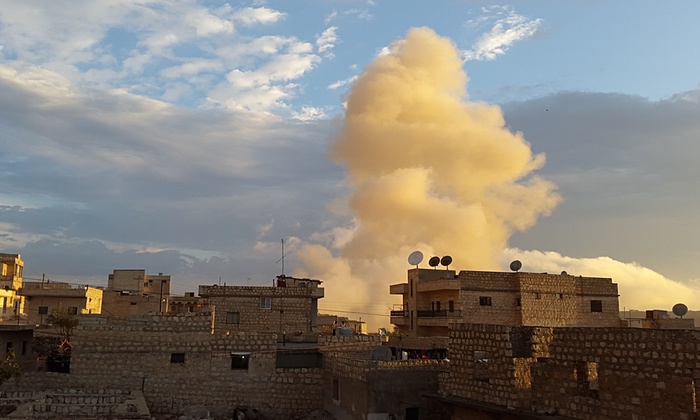
Islamic State militants have scored their most significant advances in the province of Aleppo, the closest they have come to Syria’s former commercial capital in two years, as it becomes increasingly clear that they are taking advantage of Russian airstrikes against the rest of the opposition to march into new territory.
As Russian planes continued to pound rebel forces in western Aleppo and other frontlines in the country, many of the opposition fighters who ousted Isis from the province at great cost last year found themselves pinned down and unable to halt the terror group’s largely unopposed advance towards the city at the end of last week.
“Russian planes are striking the Free Syrian Army and laying the groundwork for Daesh [Isis] control of strategic areas in Aleppo,” said a source from Tajammu al-Izzah, a moderate opposition group backed by western and Gulf states which has been hit by Russian airstrikes. “The truth is that Russia is backing Isis.”
Russia has repeatedly targeted opposition groups who have fought both Isis and the regime of President Bashar al-Assad since it launched its military intervention in Syria more than a week ago. Rebels claim the scale of the attacks against the opposition, which has dwarfed Moscow’s campaign against Isis, is aimed at dismembering the rebels to the point where the main choice in the conflict is between supporting the Assad regime or Isis.
Russian warplanes have struck rebel positions in the province of Hama, where the opposition in recent months scored significant gains, advancing closer to the Assad regime’s western strongholds. The aerial campaign paved the way for a ground offensive by the regime, though that has failed so far to win significant territory, with rebels deploying US-made TOW anti-tank missiles to check the advance. In addition, Russia has repeatedly struck rebel positions in western Aleppo, including areas held by the moderate opposition, such as Liwa Suqour al-Jabal, a faction vetted by the west, hitting weapons depots and facilities and communications buildings.
More significantly, the attacks in western Aleppo have targeted the few rebel groups that have proved capable of fighting Isis. “From a morale point of view the Russian bombing of the areas controlled by the Free Syrian Army and the Islamist factions means that Russia is not seeking to fight Daesh but to strengthen the Assad regime,” said one well-connected activist in Aleppo.
Many of the rebel groups in the area banded together in a major battle in early 2014 that managed to oust Isis from most of the province of Aleppo as well as the bordering province of Idlib, with the opposition losing more than 1,500 men in the fight. Three months ago, Isis struck back, launching a drive towards the town of Azaz in the west, part of a crucial supply line for the rebels near the Turkish border, but met stiff resistance from the rebels.
On Friday, taking advantage of the Russian bombing of western Aleppo that has forced the rebels to reinforce their defensive lines there, Isis pivoted towards the south and within hours had taken control of a series of towns and villages to the north of the city of Aleppo, the closest it has come since it was defeated by the opposition.
“Russia entered with the excuse of fighting Daesh and has barely bombed them,” said a religious official serving with Jaysh al-Fateh, a coalition of rebels fighting the Assad government and whose fighters have been targeted by the Russian airstrikes.
“Russia did not come to fight Daesh. Why didn’t they and the American coalition prevent them from advancing in northern Aleppo when they send armoured vehicles through the open desert before everyone’s eyes?
“It is clear that both Russia and the regime are laying the groundwork for Daesh,” he added. “We have a joke here that they all have one operations room.”
The terror group’s advance came on the same day as it emerged that the US was to scrap a $500m programme to train and equip moderate rebels willing to fight Isis, highlighting the lack of a western strategy towards the conflict in Syria, now in its fifth year, and which has seen more than a quarter of a million people killed.
The project had collapsed into farce over the past few months, with just 50 to 60 fighters graduating from the programme and entering Syria. The chief of the unit trained by the US was quickly kidnapped by Jabhat al-Nusra, al-Qaida’s wing in Syria, and the fighters were repeatedly ambushed and attacked by the militants, even at one point giving up arms in exchange for safe passage to the group.
In the latest testimony about the programme, American officials admitted that only a handful of fighters remained in the country. Many had rejected participation in the project because they saw the Assad regime as their primary foe.
THE GUARDIAN

Leave a Reply
You must be logged in to post a comment.